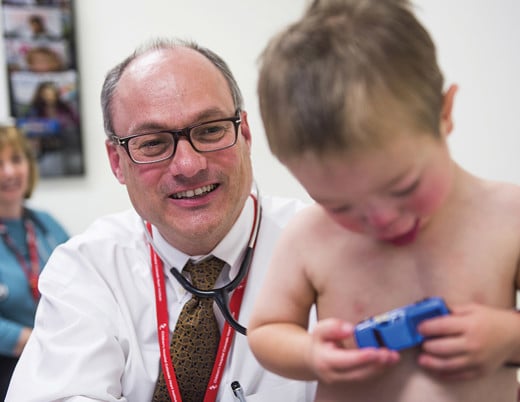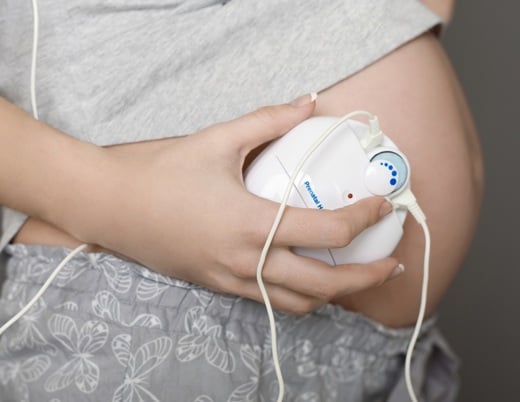Would kids diagnosed with MIS-C do better with more aggressive treatment up front?
More than 50 years after Kawasaki disease was first described, nobody knows quite what causes it or why it happens in previously healthy children. The same is true of multi-inflammatory syndrome in children, or MIS-C, which investigators linked to SARS-CoV-2 infection in early 2020. It was clear right away the two conditions had a lot in common, and so it made sense to treat them in much the same way. But Kawasaki disease experts like pediatric cardiologist Pei-Ni Jone, MD, and pediatric infectious disease specialist Samuel Dominguez, MD, quickly noticed a key difference: kids with MIS-C were sicker.
Rare but serious inflammatory syndrome
In April of 2020, healthcare systems around the world faced a steep and urgent learning curve: COVID-19 was spreading rapidly, and much about it remained unknown.
Some of the most pressing questions in pediatrics revolved around MIS-C, a severe complication that, while rare, came with some familiar hallmarks — at least to those who knew what to look for.
“Rash, red eyes, red lips, diarrhea, common things we see in Kawasaki disease,” says Dr. Jone. “Both are a hyperimmune response to trying to fight infection.”
But there are established courses of treatment. As in Kawasaki disease, patients with MIS-C responded to intravenous immunoglobin, or IVIG, a blood product containing thousands of antibodies. Drs. Jone and Dominguez, who’d run a Children’s Colorado Kawasaki Clinic together since 2011, started doing MIS-C rounds in spring of 2020, bringing together the infectious disease and cardiology teams to talk through each case every day at 9 a.m.
In many cases, they found, IVIG wasn’t enough. “We needed to adapt,” says Dr. Jone.
Catching it early
By fall of 2020, it was clear that, when it came to MIS-C, time was of the essence. “Patients with MIS-C have higher levels of systemic inflammation and more often decompensate,” says Christina Osborne, MD, “which puts them at risk for requiring admission to intensive care.”
“They can get myocarditis and very low blood pressure. The heart function goes down, the coronary arteries dilate,” adds Dr. Jone. “That’s not good. Some will get a kidney or liver disorder, their blood pressure gets so low. Some go into shock.”
A former fellow in pediatric infectious disease and current fellow in critical care – with a research interest in coronaviruses – Dr. Osborne took on the task of creating a protocol for identifying MIS-C early, with input from infectious disease, hospital medicine, critical care, cardiology, rheumatology and emergency medicine. The protocol combined recommendations from the Centers for Disease Control and Prevention and the World Health Organization, among others, but went a step further.
Children’s Colorado’s protocol was the first in the nation to include routine echocardiography for every suspected case, crucial for catching cardiac inflammation.
Infliximab versus steroids
Starting in December of 2020, the team also added, for the sickest patients, another intravenous therapy to the IVIG regimen: infliximab, a lab-grown antibody that blocks the production of tumor necrosis factor alpha, or TNF.
“We had four initial criteria: If they were in shock, they needed pressure support, they had dilated coronary arteries and they had ventricular dysfunction, we’d give them infliximab,” says Dr. Jone. “But when we looked back in February 2021 at the 72 patients we’d treated since December 2020, we realized only 20 had received IVIG alone. The rest had gotten dual therapy.”
What’s more, the 52 patients who’d received both therapies had better outcomes. They recovered faster. They required less additional therapy. In fact, a retrospective study the team published in Pediatrics showed patients who received dual therapy did better by every measure. The data was so strong the team has since implemented dual therapy into the protocol for every patient diagnosed with MIS-C.
It’s a departure from convention, not only in aggressiveness but also in protocol. Most centers have employed steroids as a second course of treatment to IVIG; the New England Journal of Medicine published a study in the summer of 2021 showing an association between treatment with IVIG plus glucocorticoids and lower risk of cardiovascular dysfunction. But another study, published in the same issue, concluded there wasn’t any difference (3).
Dr. Jone believes TNF blockers are a more intuitive treatment either way: the course of steroid treatment lasts six weeks. Infliximab requires just one intravenous dose.
1
Cole LD, Osborne CM, Silveira LJ, Rao S, Lockwood JM, Kunkel MJ, MacBrayne CE, Heizer HR, Anderson MS, Jone PN, Dominguez SR. IVIG Compared to IVIG Plus Infliximab in Multisystem Inflammatory Syndrome in Children. Pediatrics. 2021 Sep 21.
https://pubmed.ncbi.nlm.nih.gov/34548377/
2
Son MBF, Murray N, Friedman K, Young CC, Newhams MM, Feldstein LR, Loftis LL, Tarquinio KM, Singh AR, Heidemann SM, Soma VL, Riggs BJ, Fitzgerald JC, Kong M, Doymaz S, Giuliano JS Jr, Keenaghan MA, Hume JR, Hobbs CV, Schuster JE, Clouser KN, Hall MW, Smith LS, Horwitz SM, Schwartz SP, Irby K, Bradford TT, Maddux AB, Babbitt CJ, Rowan CM, McLaughlin GE, Yager PH, Maamari M, Mack EH, Carroll CL, Montgomery VL, Halasa NB, Cvijanovich NZ, Coates BM, Rose CE, Newburger JW, Patel MM, Randolph AG; Overcoming COVID-19 Investigators. Multisystem Inflammatory Syndrome in Children - Initial Therapy and Outcomes. N Engl J Med. 2021 Jul 1;385(1):23-34.
https://pubmed.ncbi.nlm.nih.gov/34133855/
3
McArdle AJ, Vito O, Patel H, Seaby EG, Shah P, Wilson C, Broderick C, Nijman R, Tremoulet AH, Munblit D, Ulloa-Gutierrez R, Carter MJ, De T, Hoggart C, Whittaker E, Herberg JA, Kaforou M, Cunnington AJ, Levin M; BATS Consortium. Treatment of Multisystem Inflammatory Syndrome in Children. N Engl J Med. 2021 Jul 1;385(1):11-22.
https://pubmed.ncbi.nlm.nih.gov/34133854/
Featured Researchers

Samuel Dominguez, MD, PhD
Pediatric infectious disease specialist
Pediatric Infectious Disease Program
Children's Hospital Colorado
Professor
Pediatrics-Infectious Diseases
University of Colorado School of Medicine





 720-777-0123
720-777-0123













